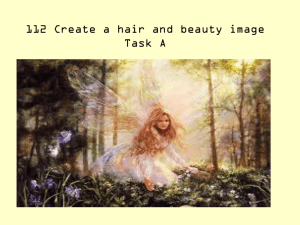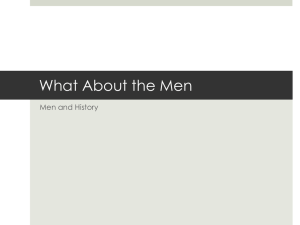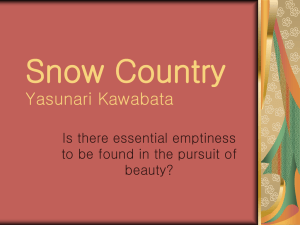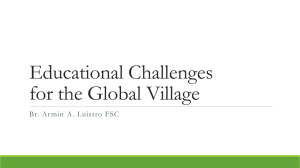Beauty
advertisement
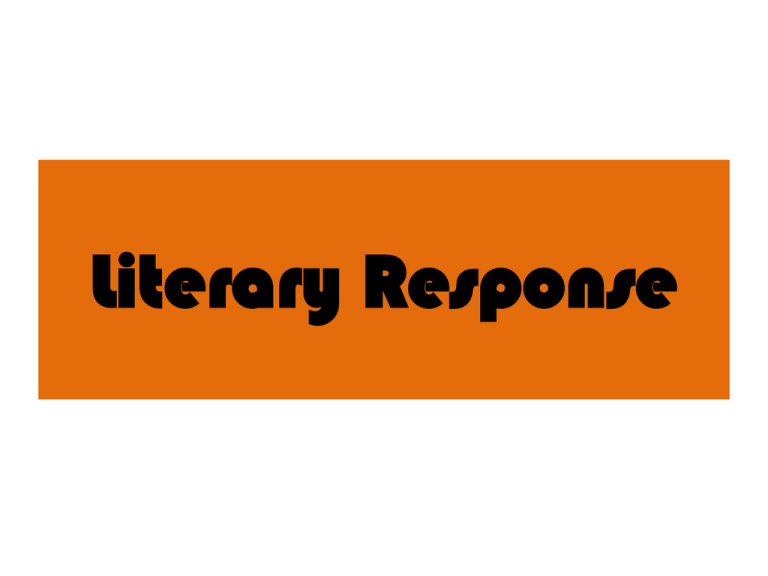
Literary Response Beauty by E Yeh Shure Beauty is seen In the sunlight, The trees, the birds, Corn growing and people working Or dancing for their harvest. Beauty is heard In the night, Wind sighing, rain falling, Or a singer chanting Anything in earnest. Beauty is in yourself. Good deeds, happy thoughts That repeat themselves In your dreams, In your work, And even in your rest. Responses to the poem “Beauty” • Read each response carefully • Decide whether the response addresses the question asked • Is there a clear thesis? • Is there evidence from the poem to support the thesis? • Is there a closing sentence? • Grade the response on a 0-2 scale Response #1 The poem “Beauty” written by E Yeh Shure was a insightful poem that expresses the true meaning of beauty. In the poem he says “Beauty is seen in the sunlight.” He also says similar things about many of the different aspects in nature. I think his message is that diamond rings and other man made materials don’t compare to the natural beauties that are constantly there. I not only believe but I know that many people are to blind to see the Earth’s glory. Most can realize it though and that in itself is a large accomplishment for all. Response #2 E Yeh Shure is trying to tell me and convince me that beauty is everywhere and that everyone, everywhere has beauty. In “Beauty” it says things like “Beauty is seen”, “beauty is heard”, and “Beauty is in yourself” and those words are saying that beauty is in everyone, and everywhere. It also talks how you are beautiful in your dreams, when you work, and even when you rest. When it says “beauty is seen”, it says how beauty is seen everywhere, like in the sunlight, the trees, the birds, and when corn is growing. I feel happy with this poem and confident. I feel this way because its convincing that everyone’s beautiful. Response #3 “Beauty” by E Yeh Shure says that beauty can be anywhere and everywhere. Beauty can be seen, heard, and felt because you see beauty in “the sunlight, the trees, the birds, corn growing and people working or dancing for their harvest.” You hear beauty “In the night, wind sighing, raining falling, or a singer chanting anything in earnest.” You feel beauty “In yourself, good deeds, happy thoughts that repeat themselves. In your dreams, in your work, and even in your rest.” The author tells me that bveauty is wonderful in many ways. This poem tells all who read it that beauty is all around us. Response #4 In E Yeh Shure’s poem “Beauty” he is trying to tell you that beauty is everywhere around you. I know that he’s trying to tell me that beauty is everywhere because it says “Beauty is seen in the sunlight, the trees, the birds, corn dancing for their harvest.” It also says that “Beauty is heard in the night, wind sighing, rain falling, or a singer chanting anything in earnest.” (omitted a repeated paragraph) So in the poem “Beauty” by E Yeh Shure, he’s trying to tell you that beauty is all around you. I know because the first two paragraphs tell me why. Response #5 The author E Yeh Shure is trying to say in her poem that Beauty is everywhere, it’s in the sunlight, in the dark, in your dreams, in your work, and even in your rest so that gives the reader a point that beauty is everywhere. This poem means that beauty is everywhere you look but it’s mostly on the inside and outside of you. I feel that this poem is very straight forward. It goes right to the point and it’s trying to say that beauty is everywhere. In the poem Beauty the author stated that beauty is seen, beauty is heard, and beauty is in yourself. That says beauty is everywhere. Response #6 I think the author is trying to tell you beauty is everywhere if you do good deeds and if you like the world that you live in. I believe that is his point because he says in his poem “beauty is in yourself good deeds happy thoughts that repeat themself.” he also says in his poem “Beauty is seen in the sun” and he also said “ Beauty is seen at night.” So that is why I think the author is trying to tell you if you do good deeds you will see beauty everywhere. Response #7 E Yeh Shure and his poem “Beauty” are trying to tell you that beauty is everything in life. Beauty can be heard and seen everywhere you go and can be anything you do. In “Beauty”, E Yeh Shure uses metaphors t show what beauty is. He says “Beauty is seen in sunlight, the trees.” He’s saying that beauty can be everywhere you look. E Yeh Shure repeats the line “Beauty is…” and in that line, he tells you what and where beauty is from “Corn growing and people working” to “wind sighing, rain falling.” “Beauty” by E Yeh Shure makes me feel happy and confident because he says “Beauty is in yourself” and that beauty is within you. The poem says that beauty is everywhere and everything in life. Response #8 The message of the poem, Beauty is that beauty is everywhere in different forms. Some examples that the author E Yeh Shure gives are the sunlight, people working, rain falling, and good deeds. The poem also states that beauty can be seen, heard, and is in yourself. I think that reading this poem creates images, sounds, and memories in the reader’s mind. The author wants the readers to feel about beauty is that there is beauty in all things and that people should appreciate it. Response #9 The poem beauty is a poem that says that nature is beautiful. He describes the forest in the word beauty. In the text its saying that the nature is beautiful and so are all of the animals in it he says that they are beautiful too. That is the poem that is beautiful called beauty. Response #10 Beauty is all around us. In the poem Beauty it gives us many examples. In this poem she thinks everything is beautiful. The author in this story is saying that beauty is always around us even in our rest. She says in the poem “ And even in our rest.” I think its always beautiful when its raining. Also I don’t think it is beautiful when it’s hailing. In this poem she is using figurative language to make it sound beautiful. So you can see it can bee very beautiful out but, it is not always beautiful out. Some times it’s the opposite of beautiful.

